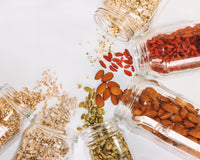food, but did you know that they are actually an incredibly healthy wholefood. Oats
are among the healthiest foods you can eat, high in fibre, protein and a wealth of
vitamins and minerals they really are hard to beat.
What are the types of oats?
Whole or jumbo oats, which are the least broken down, and therefore take
longer to cook.
Rolled oats, which have been roasted, steamed and flattened to remove the
outer shell.
Oatmeal, which has similarly been roasted, steamed and flattened, but is
ideal for making porridge.
Broadly speaking these oats all have similar nutritional contents, although
roasting and steaming oats can very slightly reduce this. Due to their similarities, it
is often best to pick oats based around what you will use them for (while also taking
the health benefits into consideration).
Do oats improve digestion?
Oats are also packed full of insoluble and soluble fibre (both of which are very
healthy) Insoluble fibre is great for aiding digestion, while soluble fibre helps to
lower cholesterol and improve heart health. As well as the obvious digestive
benefits, the high fibre content in oats has been shown to help establish healthy
gut bacteria, and generally maintain a healthy gut microbiome.
Why oats are the perfect breakfast?
One of the reasons oats are primarily used as a breakfast food is because of their
low glycemic index and slow releasing energy. The glycemic index refers to the
speed at which carbohydrates raise glucose levels in the blood, the lower the score
the slower the release of energy. The slow release of energy means that oats really
can keep you powered from breakfast until lunch, without crashing in the late
morning.Not only will oats keep your energy levels high, they will also make you feel fuller
due to their beta glucan content. Beta glucan is a specific type of hard to find
soluble fibre, which increases the water absorption in your body, this creates a
feeling of fullness and helps to stop overeating, which when combined with the
long lasting energy of oats makes them a really useful weight management tool.
The incredible nutritional benefits of oats
Oats also contain vitamins B1, B2 and inositol. Vitamin B1 (also known as thiamin)
provides a boost to the nervous system, while also helping to facilitate the slow
releasing energy mentioned above. Vitamin B2 (also known as riboflavin) is great
for helping to maintain healthy skin and hair, while also helping to provide a
strong nervous system. Inositol is unique, in that it is technically a sugar rather
than a vitamin, but it helps the body to process insulin.
Oats are a unique superfood, as they are not only a naturally gluten free and vegan
source of protein, but they are also incredibly affordable. The amount of protein in
oats is often understated in favour of its fibre contents, however dry oats actually
contain around 26 grams of protein per cup!
Why everyone should keep oats in their pantry?
The overwhelming health benefits of oats combined with how simple they are to
cook with, make them an ideal part of any balanced diet particularly for those who
are struggling with their protein or fibre intake. As well as the obvious use of oats
as a breakfast food, oats are also an incredibly useful ingredient for any aspiring
baker adding texture, flavour and a litany of health benefits to pretty much any
dish you can think of.






